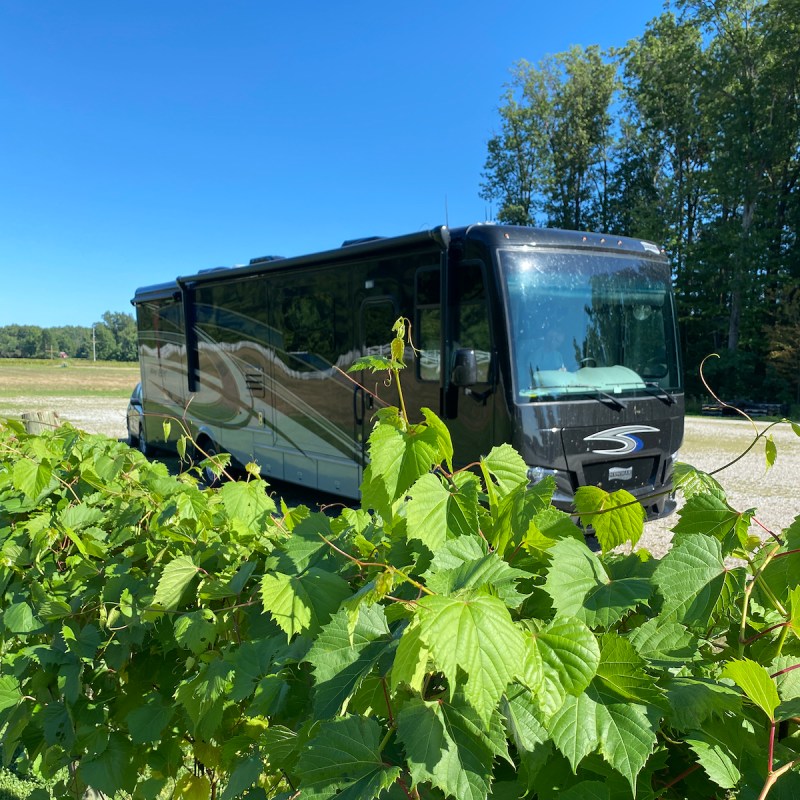
Before my husband and I bought our first motorhome in August 2020, I joined the RV membership club, Harvest Hosts. In my online research about RV life, I’d come across this nifty service that allows its members to stay overnight in their self-contained campers at wineries, breweries, and distilleries — as well as farms, museums, and other attractions — across North America. “What could be better?” I thought.
Videos by TravelAwaits
I certainly didn’t need to purchase the membership to Harvest Hosts before we bought a big rig, but that allowed me to get the specific details on all the incredibly cool places — such as a brewery/winery combo by the river in South Dakota and family-owned whiskey distillery in Kentucky — that we’d be able to reserve overnight spots at on our 7-week trek from Colorado to Maine and back. Searching all the different options mapping out our winery stays in between longer stints at private campgrounds and state parks helped to get me excited about our maiden voyage.
After two years of being an RV owner and upgrading from our original motorhome to a newer one, I’m still enamored with this opportunity to spend the night next to grapevines in scenic, rural spots across the country. My husband and I have stayed at 14 different Harvest Hosts locations on three different multi-week RV road trips, and we look forward to checking out a winery not too far from our home on a Colorado RV adventure later this summer.
In fact, in full disclosure, I quickly became such a fan of Harvest Hosts, I cold-emailed the owner of the company to ask to do some freelance writing for their website. I’ve since contributed to the blog, marketing materials, and even handled the company’s Instagram account for a short while. That said, I’ll continue renewing and using my membership (currently a $99 annual fee) for as long as we own our RV.
Here are five reasons why I love camping at wineries, breweries, and distilleries with my Harvest Hosts membership.

1. Wineries Are More Fun Than Walmarts
Harvest Hosts members are permitted to stay one night at each host location and there’s no limit to how many locations you might visit in any given year. Hosts are small businesses that are not set up like campgrounds. The locations that open up their property to RV road trippers are meant to be an alternative for boondocking (“dry camping” without hookups) at places like Walmart or Cracker Barrel parking lots.
I can personally attest that enjoying a wine flight before bed and then waking up to a view of the green countryside is preferable to going to sleep in a concrete parking lot and waking to the noise of delivery trucks at a store’s loading station.
Pro Tip: Not every Harvest Hosts location is rural and quiet. Some spots are located near highways, train tracks, or in urban downtown areas. If you’re a member who is researching a booking, be sure to read the host’s online description, as well as member reviews, so you’ll know what to expect at your planned overnight stay.

2. I’m Supporting Small Businesses
Harvest Hosts locations are places for campers to rest somewhere safe and scenic for the night and in exchange, we are expected to make a small purchase — at least $20 toward drinks, food, farm goods, a museum tour, or other souvenirs is recommended. So, while this boondocking isn’t free by any means — and in fact, my husband and I typically end up spending much more than $20 on food and drink at each location — I look at the expenditure as supporting a small, local business. I’m happy for my “camping fees” to go toward a hardworking small-business owner or family-run company rather than a large, privately owned campground or corporation.
Pro Tip: Some host locations are nonprofit organizations, such as historic libraries or religious houses of worship. For these spots, if there’s no gift shop for something to buy, Harvest Hosts members can leave a donation.

3. We’ve Enjoyed Some Fabulous Food And Drink
Typically, when we pull up to a winery, brewery, or distillery, my husband and I have done our research ahead of time. That way, we determine whether we’ll be sampling wine, beer, or spirits. We also determine if we’re going to have an appetizer or a full meal. More often than not, we’re happily partaking in brewpub snacks or a lovely charcuterie platter to accompany our drinks. After several homemade meals in our camper, it’s always a treat to enjoy being waited on and delving into local foods, like the savory cheese curds at Tumbled Rock Brewery in Baraboo, Wisconsin.
My husband discovered a new favorite whiskey that he’s always eager to share with guests visiting our Colorado home. We picked up a couple of bottles from Wood Hat Spirits in Florence, Missouri, which is a distillery that uses differently colored corn, such as red, blue, and white to distill its varieties of corn whiskey. I’m not a whiskey drinker, but my husband swears it is surprisingly tasty.

4. We’ve Been Pleasantly Entertained With Live Music
My husband and I love listening to live music at dining and drinking venues. If there’s a dance floor where we can show off our country-swing dance moves, well, that’s even better. Sometimes we’ve stumbled upon performers at Harvest Hosts locations, like the time a duo was performing favorite folk hits at White Winter Winery in Iron River, Wisconsin.
Other times, we’ve purposely scheduled our visits to coincide with live performances. In Pana, Illinois, we danced in the rain while a country band played at Arpeggio Winery, earning free insulated beer holders, to boot. “We always reward the first people on the dance floor,” the leader singer told us.

5. We’ve Met Some Friendly And Generous People
By and large, the people who run the wineries, breweries, and distilleries we’ve overnighted at are incredibly friendly folks. They sign up to be Harvest Hosts locations because they’re happy to share their corner of the world with visitors. They’re usually pleased to strike up conversations and learn about all the travelers who pass through their property. We’ve also come across some very generous people.
For example, when we pulled into Casey Jones Distillery in Hopkinsville, Kentucky, we realized we were quite low on water, having somehow forgotten to fill up our tanks at our last campground. The owner had us pull around to a spigot to fill our depleted tanks at no charge. Another time, we were talking to the owners of 4e Winery in Mapleton, North Dakota. We were overstaying our welcome as they were closing up their restaurant and tasting room for the night. They asked us to join them for a homemade dinner (a delicious vegan dish made from mushrooms harvested in their yard) and some not-usually-served-to-the-public wine.
We’ve also met some other interesting Harvest Hosts members. While the parking areas at host locations aren’t meant to be used as campsites — generally speaking, campfires and grilling outside aren’t permitted. It’s typically accepted that members will set out chairs near their campers to enjoy a bottle of wine or a growler of beer they just purchased. We did just that one night at Mac’s Creek Winery & Brewery in Nebraska and we happened to meet other campers who were from my childhood hometown. It was fun to chat with them for a while about some of the same people and places we knew.
Pro Tip: As enjoyable as it can be to chat away with winemakers or like-minded campers, sometimes all you want to do is purchase an on-site item and hit the sack. That’s okay. The beauty of Harvest Hosts is that you can make the membership work for you. While my husband and I enjoy sampling local wine, beer, and spirits, you can make an entire itinerary out of family-friendly farms if you like. Perhaps if we ever RV with grandchildren we’ll change our tune. For now, we’ll continue to drink our way through some great wineries, breweries, and distilleries on our travels, thanks to Harvest Hosts.
For more tips on traveling in your RV, check out these articles:
